Coaching Models: Enhancing Skills and Professional Development Plan
VerifiedAdded on 2023/06/18
|13
|3548
|264
Report
AI Summary
This report provides a detailed overview of coaching models and their application in professional development. It begins with an introduction to coaching in academic and career settings, emphasizing its role in skill enhancement and knowledge acquisition. The report critically evaluates various coaching models, including the GROW model, STEPPA model, motivational interviewing, and the question-and-answer approach, highlighting their strengths and applications. A self-assessment tool is discussed to evaluate individual coaching needs, followed by a SWOT analysis to identify personal strengths, weaknesses, opportunities, and threats. Based on the SWOT analysis, the report identifies two key areas for development: time management and management skills. Finally, it outlines a personal development plan focused on enhancing these skills using coaching model strategies. This resource is helpful for students seeking to understand and implement coaching models for their own professional growth.
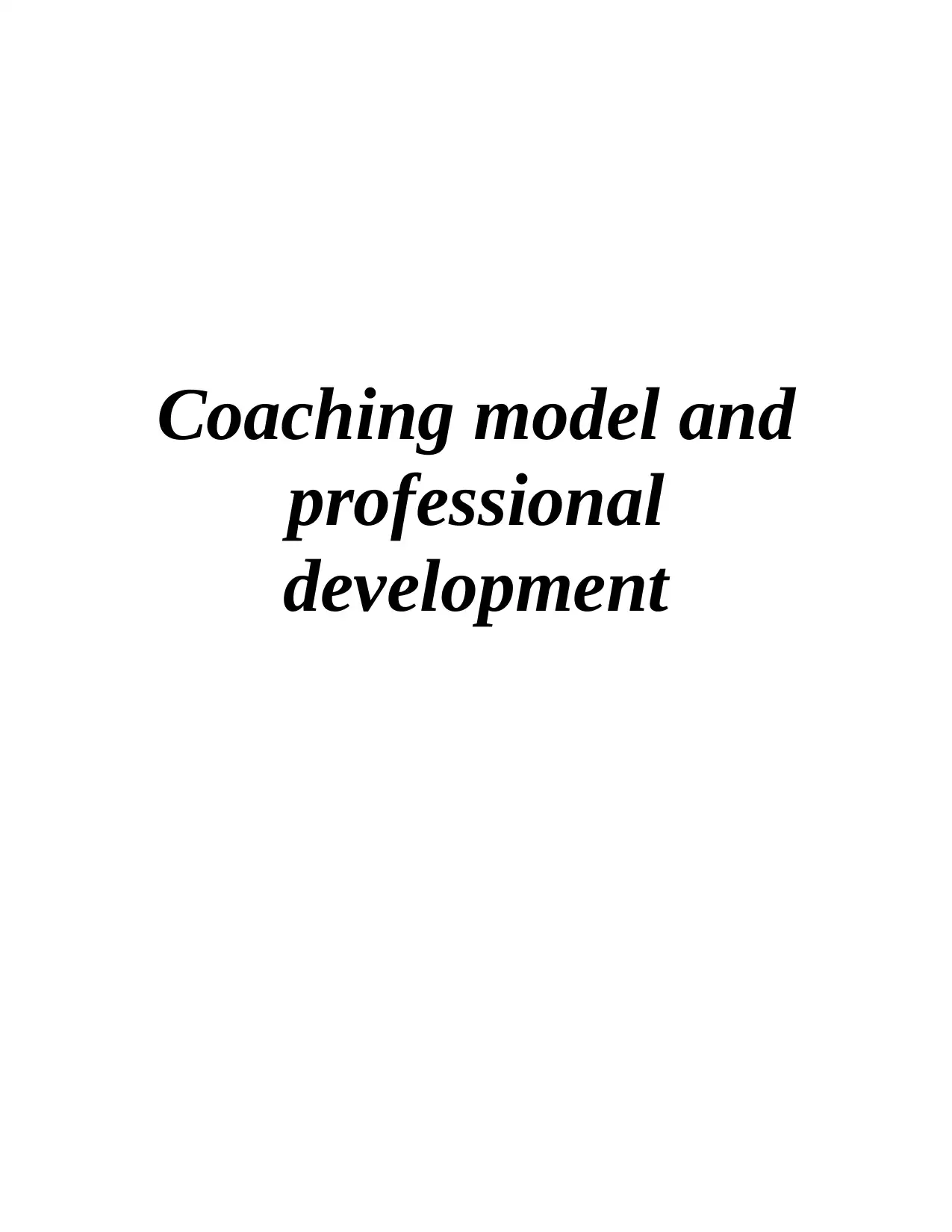
Coaching model and
professional
development
professional
development
Paraphrase This Document
Need a fresh take? Get an instant paraphrase of this document with our AI Paraphraser
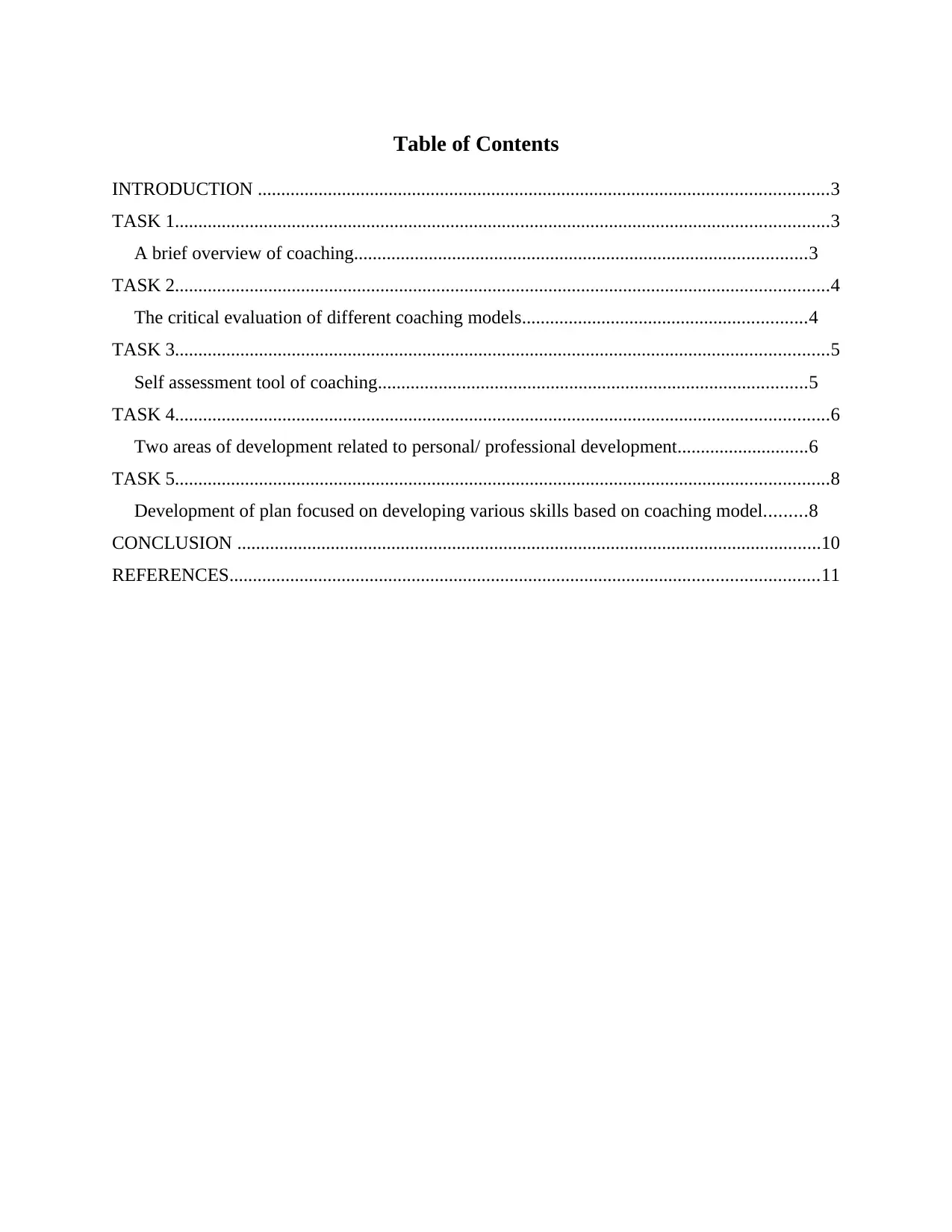
Table of Contents
INTRODUCTION ..........................................................................................................................3
TASK 1............................................................................................................................................3
A brief overview of coaching.................................................................................................3
TASK 2............................................................................................................................................4
The critical evaluation of different coaching models.............................................................4
TASK 3............................................................................................................................................5
Self assessment tool of coaching............................................................................................5
TASK 4............................................................................................................................................6
Two areas of development related to personal/ professional development............................6
TASK 5............................................................................................................................................8
Development of plan focused on developing various skills based on coaching model.........8
CONCLUSION .............................................................................................................................10
REFERENCES..............................................................................................................................11
INTRODUCTION ..........................................................................................................................3
TASK 1............................................................................................................................................3
A brief overview of coaching.................................................................................................3
TASK 2............................................................................................................................................4
The critical evaluation of different coaching models.............................................................4
TASK 3............................................................................................................................................5
Self assessment tool of coaching............................................................................................5
TASK 4............................................................................................................................................6
Two areas of development related to personal/ professional development............................6
TASK 5............................................................................................................................................8
Development of plan focused on developing various skills based on coaching model.........8
CONCLUSION .............................................................................................................................10
REFERENCES..............................................................................................................................11
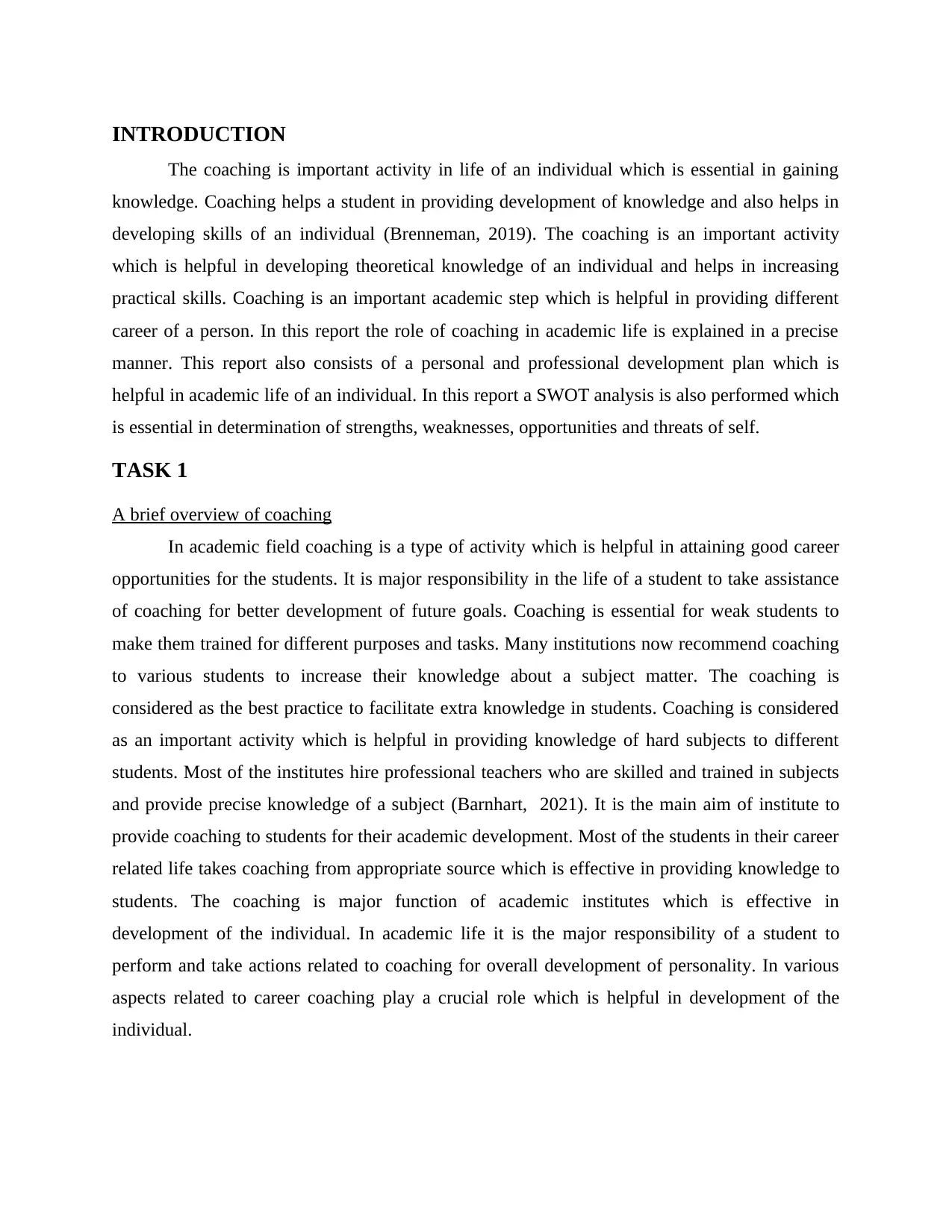
INTRODUCTION
The coaching is important activity in life of an individual which is essential in gaining
knowledge. Coaching helps a student in providing development of knowledge and also helps in
developing skills of an individual (Brenneman, 2019). The coaching is an important activity
which is helpful in developing theoretical knowledge of an individual and helps in increasing
practical skills. Coaching is an important academic step which is helpful in providing different
career of a person. In this report the role of coaching in academic life is explained in a precise
manner. This report also consists of a personal and professional development plan which is
helpful in academic life of an individual. In this report a SWOT analysis is also performed which
is essential in determination of strengths, weaknesses, opportunities and threats of self.
TASK 1
A brief overview of coaching
In academic field coaching is a type of activity which is helpful in attaining good career
opportunities for the students. It is major responsibility in the life of a student to take assistance
of coaching for better development of future goals. Coaching is essential for weak students to
make them trained for different purposes and tasks. Many institutions now recommend coaching
to various students to increase their knowledge about a subject matter. The coaching is
considered as the best practice to facilitate extra knowledge in students. Coaching is considered
as an important activity which is helpful in providing knowledge of hard subjects to different
students. Most of the institutes hire professional teachers who are skilled and trained in subjects
and provide precise knowledge of a subject (Barnhart, 2021). It is the main aim of institute to
provide coaching to students for their academic development. Most of the students in their career
related life takes coaching from appropriate source which is effective in providing knowledge to
students. The coaching is major function of academic institutes which is effective in
development of the individual. In academic life it is the major responsibility of a student to
perform and take actions related to coaching for overall development of personality. In various
aspects related to career coaching play a crucial role which is helpful in development of the
individual.
The coaching is important activity in life of an individual which is essential in gaining
knowledge. Coaching helps a student in providing development of knowledge and also helps in
developing skills of an individual (Brenneman, 2019). The coaching is an important activity
which is helpful in developing theoretical knowledge of an individual and helps in increasing
practical skills. Coaching is an important academic step which is helpful in providing different
career of a person. In this report the role of coaching in academic life is explained in a precise
manner. This report also consists of a personal and professional development plan which is
helpful in academic life of an individual. In this report a SWOT analysis is also performed which
is essential in determination of strengths, weaknesses, opportunities and threats of self.
TASK 1
A brief overview of coaching
In academic field coaching is a type of activity which is helpful in attaining good career
opportunities for the students. It is major responsibility in the life of a student to take assistance
of coaching for better development of future goals. Coaching is essential for weak students to
make them trained for different purposes and tasks. Many institutions now recommend coaching
to various students to increase their knowledge about a subject matter. The coaching is
considered as the best practice to facilitate extra knowledge in students. Coaching is considered
as an important activity which is helpful in providing knowledge of hard subjects to different
students. Most of the institutes hire professional teachers who are skilled and trained in subjects
and provide precise knowledge of a subject (Barnhart, 2021). It is the main aim of institute to
provide coaching to students for their academic development. Most of the students in their career
related life takes coaching from appropriate source which is effective in providing knowledge to
students. The coaching is major function of academic institutes which is effective in
development of the individual. In academic life it is the major responsibility of a student to
perform and take actions related to coaching for overall development of personality. In various
aspects related to career coaching play a crucial role which is helpful in development of the
individual.
⊘ This is a preview!⊘
Do you want full access?
Subscribe today to unlock all pages.

Trusted by 1+ million students worldwide
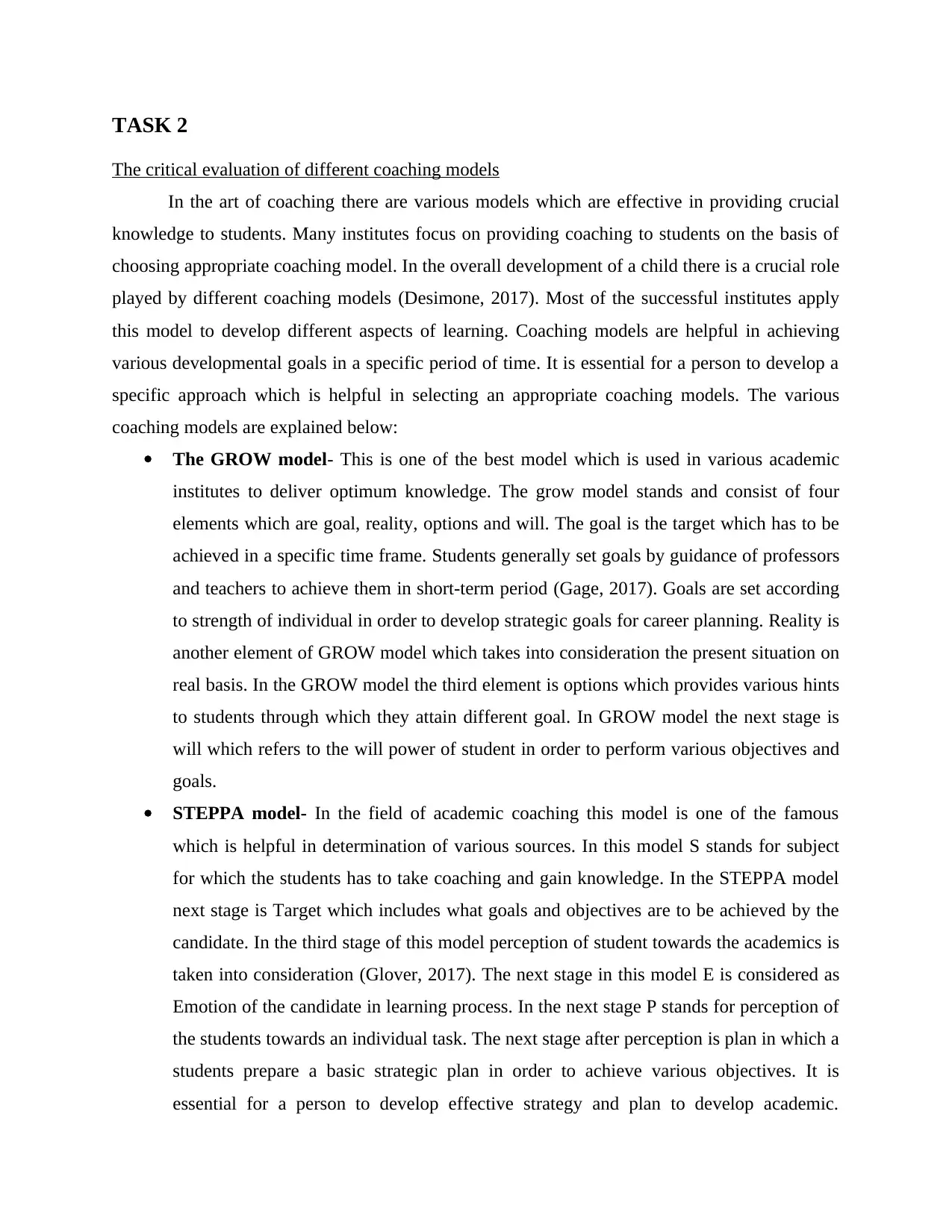
TASK 2
The critical evaluation of different coaching models
In the art of coaching there are various models which are effective in providing crucial
knowledge to students. Many institutes focus on providing coaching to students on the basis of
choosing appropriate coaching model. In the overall development of a child there is a crucial role
played by different coaching models (Desimone, 2017). Most of the successful institutes apply
this model to develop different aspects of learning. Coaching models are helpful in achieving
various developmental goals in a specific period of time. It is essential for a person to develop a
specific approach which is helpful in selecting an appropriate coaching models. The various
coaching models are explained below:
The GROW model- This is one of the best model which is used in various academic
institutes to deliver optimum knowledge. The grow model stands and consist of four
elements which are goal, reality, options and will. The goal is the target which has to be
achieved in a specific time frame. Students generally set goals by guidance of professors
and teachers to achieve them in short-term period (Gage, 2017). Goals are set according
to strength of individual in order to develop strategic goals for career planning. Reality is
another element of GROW model which takes into consideration the present situation on
real basis. In the GROW model the third element is options which provides various hints
to students through which they attain different goal. In GROW model the next stage is
will which refers to the will power of student in order to perform various objectives and
goals.
STEPPA model- In the field of academic coaching this model is one of the famous
which is helpful in determination of various sources. In this model S stands for subject
for which the students has to take coaching and gain knowledge. In the STEPPA model
next stage is Target which includes what goals and objectives are to be achieved by the
candidate. In the third stage of this model perception of student towards the academics is
taken into consideration (Glover, 2017). The next stage in this model E is considered as
Emotion of the candidate in learning process. In the next stage P stands for perception of
the students towards an individual task. The next stage after perception is plan in which a
students prepare a basic strategic plan in order to achieve various objectives. It is
essential for a person to develop effective strategy and plan to develop academic.
The critical evaluation of different coaching models
In the art of coaching there are various models which are effective in providing crucial
knowledge to students. Many institutes focus on providing coaching to students on the basis of
choosing appropriate coaching model. In the overall development of a child there is a crucial role
played by different coaching models (Desimone, 2017). Most of the successful institutes apply
this model to develop different aspects of learning. Coaching models are helpful in achieving
various developmental goals in a specific period of time. It is essential for a person to develop a
specific approach which is helpful in selecting an appropriate coaching models. The various
coaching models are explained below:
The GROW model- This is one of the best model which is used in various academic
institutes to deliver optimum knowledge. The grow model stands and consist of four
elements which are goal, reality, options and will. The goal is the target which has to be
achieved in a specific time frame. Students generally set goals by guidance of professors
and teachers to achieve them in short-term period (Gage, 2017). Goals are set according
to strength of individual in order to develop strategic goals for career planning. Reality is
another element of GROW model which takes into consideration the present situation on
real basis. In the GROW model the third element is options which provides various hints
to students through which they attain different goal. In GROW model the next stage is
will which refers to the will power of student in order to perform various objectives and
goals.
STEPPA model- In the field of academic coaching this model is one of the famous
which is helpful in determination of various sources. In this model S stands for subject
for which the students has to take coaching and gain knowledge. In the STEPPA model
next stage is Target which includes what goals and objectives are to be achieved by the
candidate. In the third stage of this model perception of student towards the academics is
taken into consideration (Glover, 2017). The next stage in this model E is considered as
Emotion of the candidate in learning process. In the next stage P stands for perception of
the students towards an individual task. The next stage after perception is plan in which a
students prepare a basic strategic plan in order to achieve various objectives. It is
essential for a person to develop effective strategy and plan to develop academic.
Paraphrase This Document
Need a fresh take? Get an instant paraphrase of this document with our AI Paraphraser
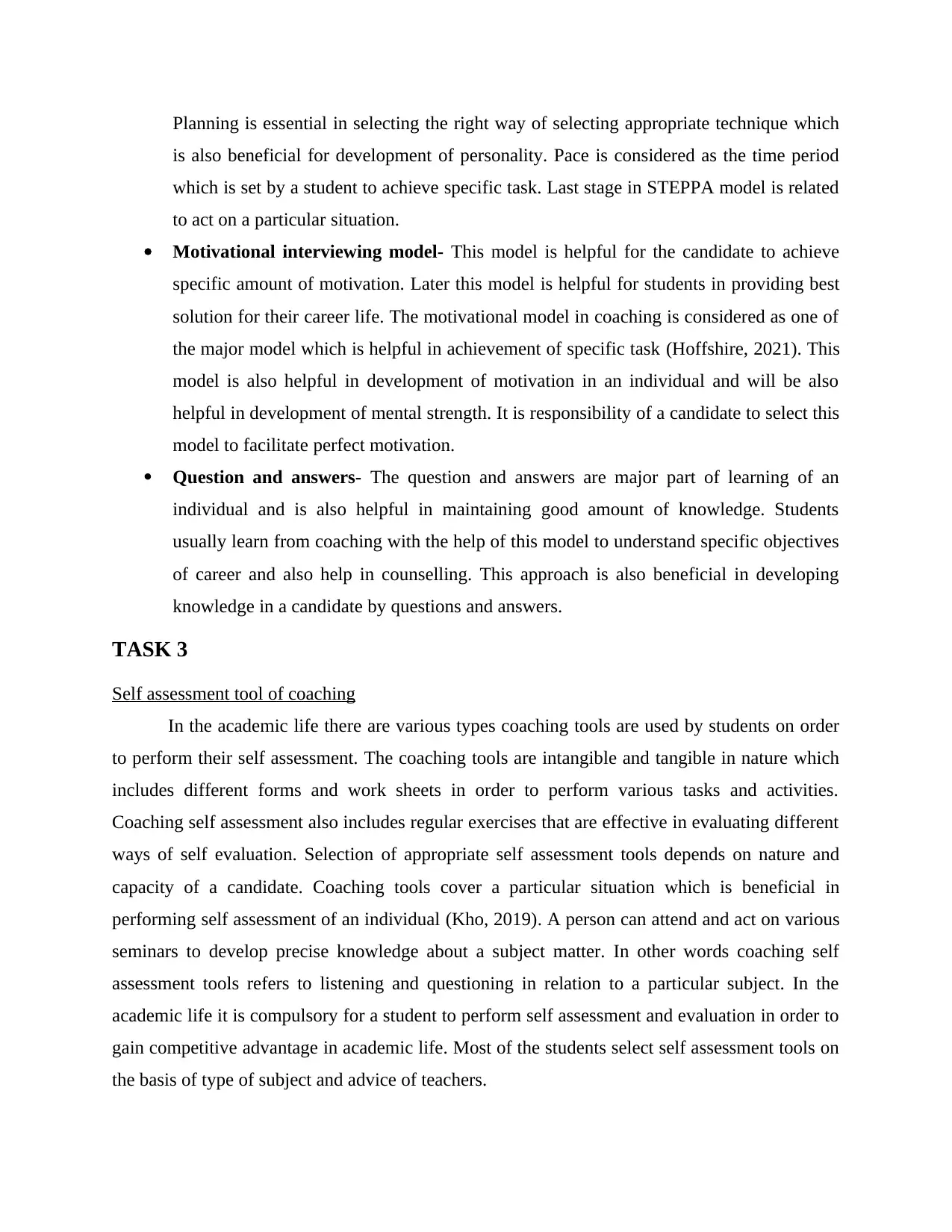
Planning is essential in selecting the right way of selecting appropriate technique which
is also beneficial for development of personality. Pace is considered as the time period
which is set by a student to achieve specific task. Last stage in STEPPA model is related
to act on a particular situation.
Motivational interviewing model- This model is helpful for the candidate to achieve
specific amount of motivation. Later this model is helpful for students in providing best
solution for their career life. The motivational model in coaching is considered as one of
the major model which is helpful in achievement of specific task (Hoffshire, 2021). This
model is also helpful in development of motivation in an individual and will be also
helpful in development of mental strength. It is responsibility of a candidate to select this
model to facilitate perfect motivation.
Question and answers- The question and answers are major part of learning of an
individual and is also helpful in maintaining good amount of knowledge. Students
usually learn from coaching with the help of this model to understand specific objectives
of career and also help in counselling. This approach is also beneficial in developing
knowledge in a candidate by questions and answers.
TASK 3
Self assessment tool of coaching
In the academic life there are various types coaching tools are used by students on order
to perform their self assessment. The coaching tools are intangible and tangible in nature which
includes different forms and work sheets in order to perform various tasks and activities.
Coaching self assessment also includes regular exercises that are effective in evaluating different
ways of self evaluation. Selection of appropriate self assessment tools depends on nature and
capacity of a candidate. Coaching tools cover a particular situation which is beneficial in
performing self assessment of an individual (Kho, 2019). A person can attend and act on various
seminars to develop precise knowledge about a subject matter. In other words coaching self
assessment tools refers to listening and questioning in relation to a particular subject. In the
academic life it is compulsory for a student to perform self assessment and evaluation in order to
gain competitive advantage in academic life. Most of the students select self assessment tools on
the basis of type of subject and advice of teachers.
is also beneficial for development of personality. Pace is considered as the time period
which is set by a student to achieve specific task. Last stage in STEPPA model is related
to act on a particular situation.
Motivational interviewing model- This model is helpful for the candidate to achieve
specific amount of motivation. Later this model is helpful for students in providing best
solution for their career life. The motivational model in coaching is considered as one of
the major model which is helpful in achievement of specific task (Hoffshire, 2021). This
model is also helpful in development of motivation in an individual and will be also
helpful in development of mental strength. It is responsibility of a candidate to select this
model to facilitate perfect motivation.
Question and answers- The question and answers are major part of learning of an
individual and is also helpful in maintaining good amount of knowledge. Students
usually learn from coaching with the help of this model to understand specific objectives
of career and also help in counselling. This approach is also beneficial in developing
knowledge in a candidate by questions and answers.
TASK 3
Self assessment tool of coaching
In the academic life there are various types coaching tools are used by students on order
to perform their self assessment. The coaching tools are intangible and tangible in nature which
includes different forms and work sheets in order to perform various tasks and activities.
Coaching self assessment also includes regular exercises that are effective in evaluating different
ways of self evaluation. Selection of appropriate self assessment tools depends on nature and
capacity of a candidate. Coaching tools cover a particular situation which is beneficial in
performing self assessment of an individual (Kho, 2019). A person can attend and act on various
seminars to develop precise knowledge about a subject matter. In other words coaching self
assessment tools refers to listening and questioning in relation to a particular subject. In the
academic life it is compulsory for a student to perform self assessment and evaluation in order to
gain competitive advantage in academic life. Most of the students select self assessment tools on
the basis of type of subject and advice of teachers.
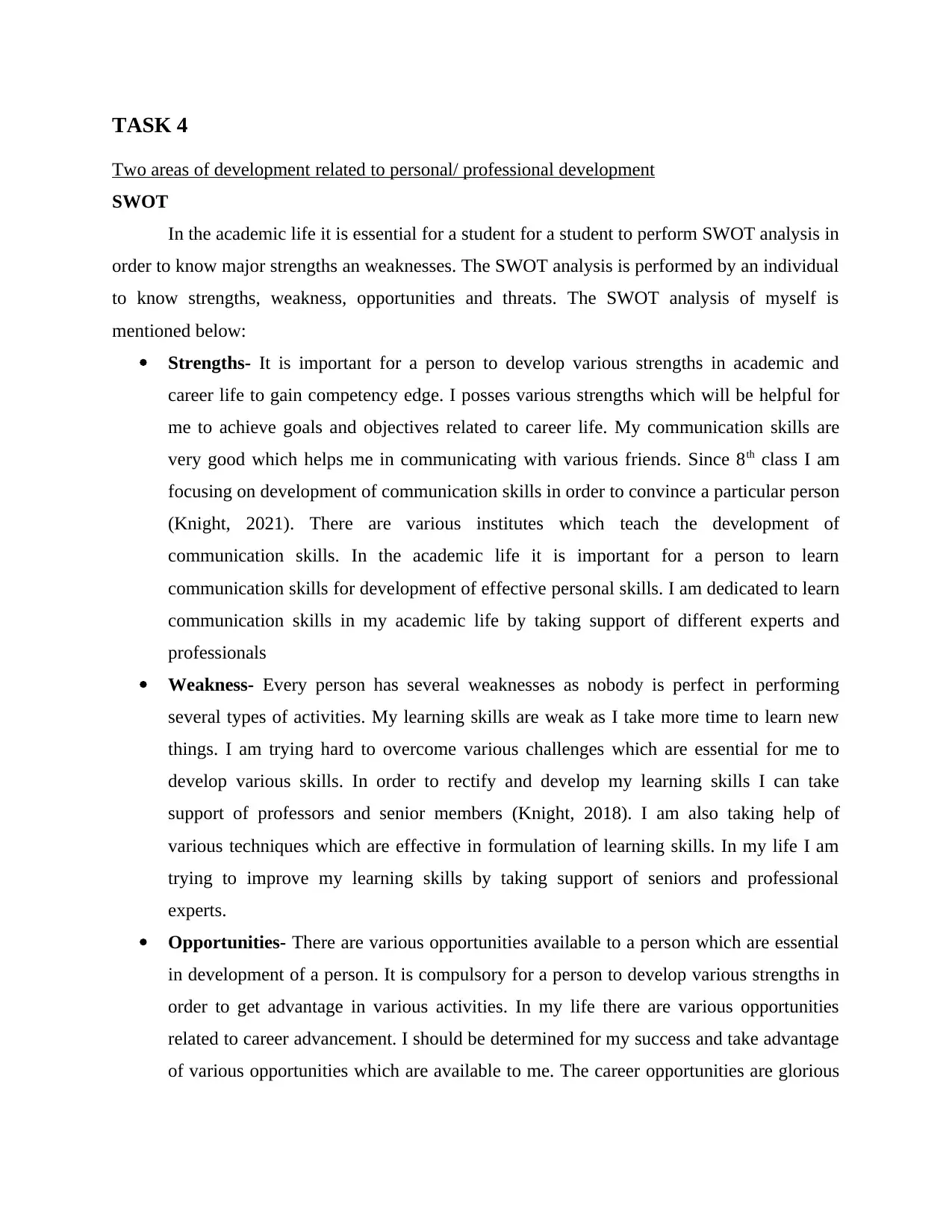
TASK 4
Two areas of development related to personal/ professional development
SWOT
In the academic life it is essential for a student for a student to perform SWOT analysis in
order to know major strengths an weaknesses. The SWOT analysis is performed by an individual
to know strengths, weakness, opportunities and threats. The SWOT analysis of myself is
mentioned below:
Strengths- It is important for a person to develop various strengths in academic and
career life to gain competency edge. I posses various strengths which will be helpful for
me to achieve goals and objectives related to career life. My communication skills are
very good which helps me in communicating with various friends. Since 8th class I am
focusing on development of communication skills in order to convince a particular person
(Knight, 2021). There are various institutes which teach the development of
communication skills. In the academic life it is important for a person to learn
communication skills for development of effective personal skills. I am dedicated to learn
communication skills in my academic life by taking support of different experts and
professionals
Weakness- Every person has several weaknesses as nobody is perfect in performing
several types of activities. My learning skills are weak as I take more time to learn new
things. I am trying hard to overcome various challenges which are essential for me to
develop various skills. In order to rectify and develop my learning skills I can take
support of professors and senior members (Knight, 2018). I am also taking help of
various techniques which are effective in formulation of learning skills. In my life I am
trying to improve my learning skills by taking support of seniors and professional
experts.
Opportunities- There are various opportunities available to a person which are essential
in development of a person. It is compulsory for a person to develop various strengths in
order to get advantage in various activities. In my life there are various opportunities
related to career advancement. I should be determined for my success and take advantage
of various opportunities which are available to me. The career opportunities are glorious
Two areas of development related to personal/ professional development
SWOT
In the academic life it is essential for a student for a student to perform SWOT analysis in
order to know major strengths an weaknesses. The SWOT analysis is performed by an individual
to know strengths, weakness, opportunities and threats. The SWOT analysis of myself is
mentioned below:
Strengths- It is important for a person to develop various strengths in academic and
career life to gain competency edge. I posses various strengths which will be helpful for
me to achieve goals and objectives related to career life. My communication skills are
very good which helps me in communicating with various friends. Since 8th class I am
focusing on development of communication skills in order to convince a particular person
(Knight, 2021). There are various institutes which teach the development of
communication skills. In the academic life it is important for a person to learn
communication skills for development of effective personal skills. I am dedicated to learn
communication skills in my academic life by taking support of different experts and
professionals
Weakness- Every person has several weaknesses as nobody is perfect in performing
several types of activities. My learning skills are weak as I take more time to learn new
things. I am trying hard to overcome various challenges which are essential for me to
develop various skills. In order to rectify and develop my learning skills I can take
support of professors and senior members (Knight, 2018). I am also taking help of
various techniques which are effective in formulation of learning skills. In my life I am
trying to improve my learning skills by taking support of seniors and professional
experts.
Opportunities- There are various opportunities available to a person which are essential
in development of a person. It is compulsory for a person to develop various strengths in
order to get advantage in various activities. In my life there are various opportunities
related to career advancement. I should be determined for my success and take advantage
of various opportunities which are available to me. The career opportunities are glorious
⊘ This is a preview!⊘
Do you want full access?
Subscribe today to unlock all pages.

Trusted by 1+ million students worldwide
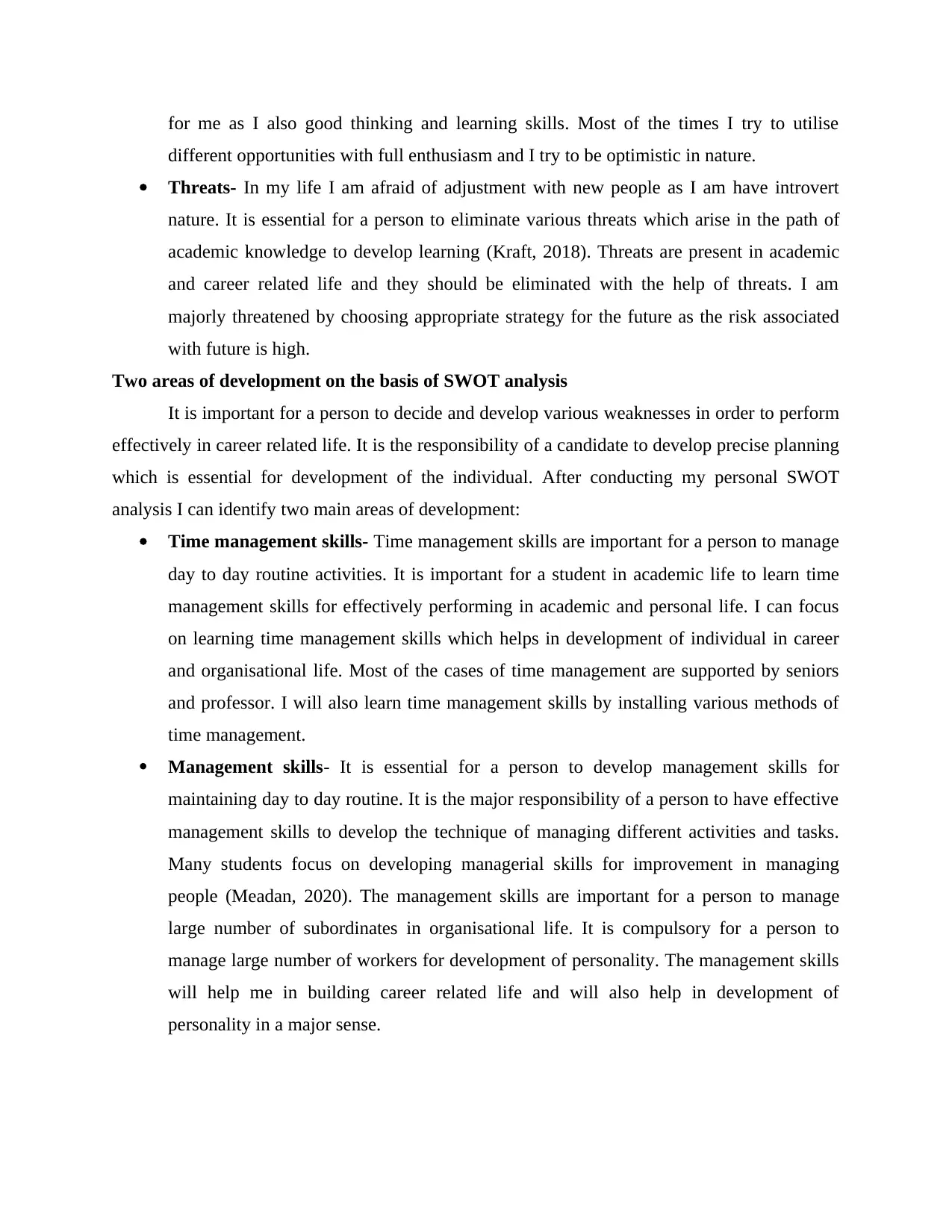
for me as I also good thinking and learning skills. Most of the times I try to utilise
different opportunities with full enthusiasm and I try to be optimistic in nature.
Threats- In my life I am afraid of adjustment with new people as I am have introvert
nature. It is essential for a person to eliminate various threats which arise in the path of
academic knowledge to develop learning (Kraft, 2018). Threats are present in academic
and career related life and they should be eliminated with the help of threats. I am
majorly threatened by choosing appropriate strategy for the future as the risk associated
with future is high.
Two areas of development on the basis of SWOT analysis
It is important for a person to decide and develop various weaknesses in order to perform
effectively in career related life. It is the responsibility of a candidate to develop precise planning
which is essential for development of the individual. After conducting my personal SWOT
analysis I can identify two main areas of development:
Time management skills- Time management skills are important for a person to manage
day to day routine activities. It is important for a student in academic life to learn time
management skills for effectively performing in academic and personal life. I can focus
on learning time management skills which helps in development of individual in career
and organisational life. Most of the cases of time management are supported by seniors
and professor. I will also learn time management skills by installing various methods of
time management.
Management skills- It is essential for a person to develop management skills for
maintaining day to day routine. It is the major responsibility of a person to have effective
management skills to develop the technique of managing different activities and tasks.
Many students focus on developing managerial skills for improvement in managing
people (Meadan, 2020). The management skills are important for a person to manage
large number of subordinates in organisational life. It is compulsory for a person to
manage large number of workers for development of personality. The management skills
will help me in building career related life and will also help in development of
personality in a major sense.
different opportunities with full enthusiasm and I try to be optimistic in nature.
Threats- In my life I am afraid of adjustment with new people as I am have introvert
nature. It is essential for a person to eliminate various threats which arise in the path of
academic knowledge to develop learning (Kraft, 2018). Threats are present in academic
and career related life and they should be eliminated with the help of threats. I am
majorly threatened by choosing appropriate strategy for the future as the risk associated
with future is high.
Two areas of development on the basis of SWOT analysis
It is important for a person to decide and develop various weaknesses in order to perform
effectively in career related life. It is the responsibility of a candidate to develop precise planning
which is essential for development of the individual. After conducting my personal SWOT
analysis I can identify two main areas of development:
Time management skills- Time management skills are important for a person to manage
day to day routine activities. It is important for a student in academic life to learn time
management skills for effectively performing in academic and personal life. I can focus
on learning time management skills which helps in development of individual in career
and organisational life. Most of the cases of time management are supported by seniors
and professor. I will also learn time management skills by installing various methods of
time management.
Management skills- It is essential for a person to develop management skills for
maintaining day to day routine. It is the major responsibility of a person to have effective
management skills to develop the technique of managing different activities and tasks.
Many students focus on developing managerial skills for improvement in managing
people (Meadan, 2020). The management skills are important for a person to manage
large number of subordinates in organisational life. It is compulsory for a person to
manage large number of workers for development of personality. The management skills
will help me in building career related life and will also help in development of
personality in a major sense.
Paraphrase This Document
Need a fresh take? Get an instant paraphrase of this document with our AI Paraphraser
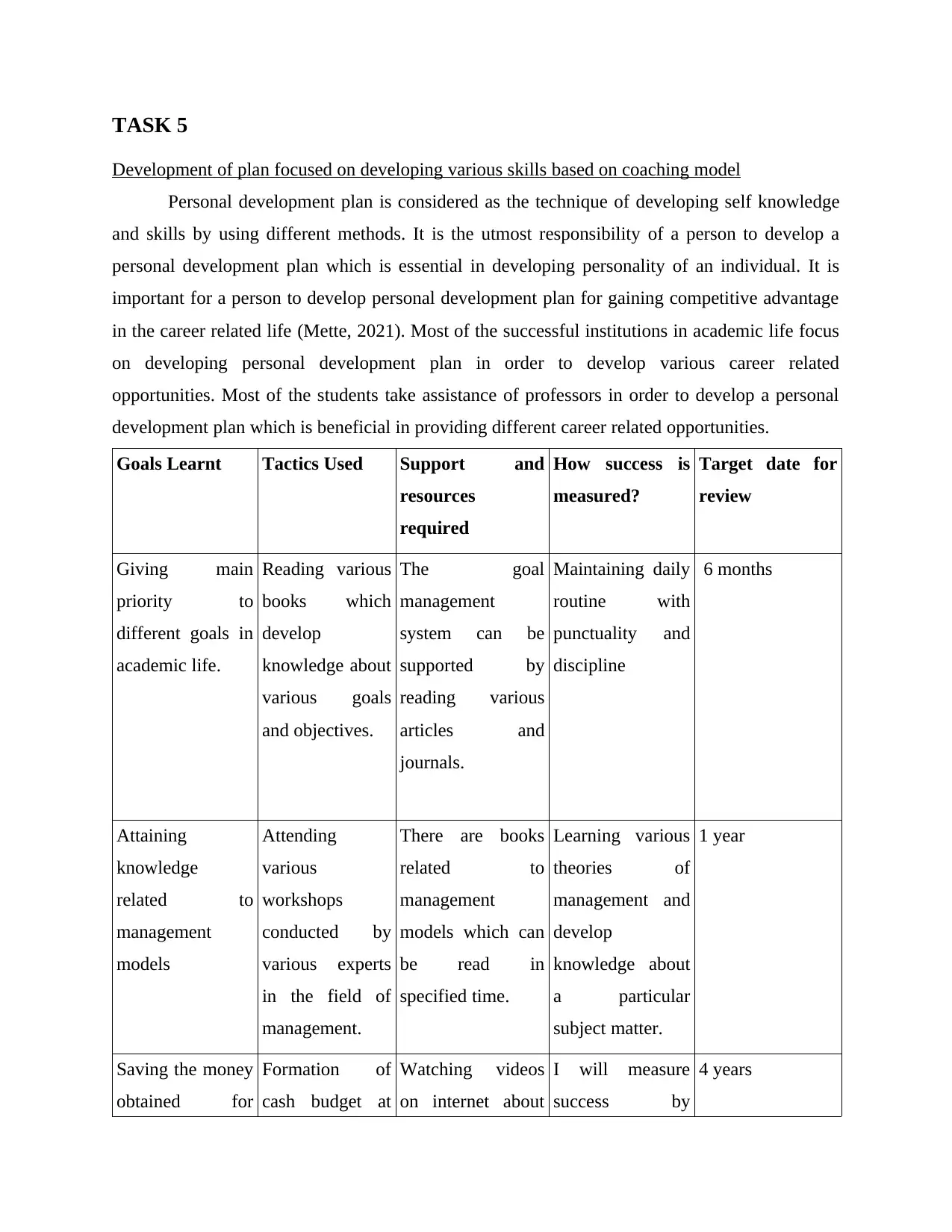
TASK 5
Development of plan focused on developing various skills based on coaching model
Personal development plan is considered as the technique of developing self knowledge
and skills by using different methods. It is the utmost responsibility of a person to develop a
personal development plan which is essential in developing personality of an individual. It is
important for a person to develop personal development plan for gaining competitive advantage
in the career related life (Mette, 2021). Most of the successful institutions in academic life focus
on developing personal development plan in order to develop various career related
opportunities. Most of the students take assistance of professors in order to develop a personal
development plan which is beneficial in providing different career related opportunities.
Goals Learnt Tactics Used Support and
resources
required
How success is
measured?
Target date for
review
Giving main
priority to
different goals in
academic life.
Reading various
books which
develop
knowledge about
various goals
and objectives.
The goal
management
system can be
supported by
reading various
articles and
journals.
Maintaining daily
routine with
punctuality and
discipline
6 months
Attaining
knowledge
related to
management
models
Attending
various
workshops
conducted by
various experts
in the field of
management.
There are books
related to
management
models which can
be read in
specified time.
Learning various
theories of
management and
develop
knowledge about
a particular
subject matter.
1 year
Saving the money
obtained for
Formation of
cash budget at
Watching videos
on internet about
I will measure
success by
4 years
Development of plan focused on developing various skills based on coaching model
Personal development plan is considered as the technique of developing self knowledge
and skills by using different methods. It is the utmost responsibility of a person to develop a
personal development plan which is essential in developing personality of an individual. It is
important for a person to develop personal development plan for gaining competitive advantage
in the career related life (Mette, 2021). Most of the successful institutions in academic life focus
on developing personal development plan in order to develop various career related
opportunities. Most of the students take assistance of professors in order to develop a personal
development plan which is beneficial in providing different career related opportunities.
Goals Learnt Tactics Used Support and
resources
required
How success is
measured?
Target date for
review
Giving main
priority to
different goals in
academic life.
Reading various
books which
develop
knowledge about
various goals
and objectives.
The goal
management
system can be
supported by
reading various
articles and
journals.
Maintaining daily
routine with
punctuality and
discipline
6 months
Attaining
knowledge
related to
management
models
Attending
various
workshops
conducted by
various experts
in the field of
management.
There are books
related to
management
models which can
be read in
specified time.
Learning various
theories of
management and
develop
knowledge about
a particular
subject matter.
1 year
Saving the money
obtained for
Formation of
cash budget at
Watching videos
on internet about
I will measure
success by
4 years
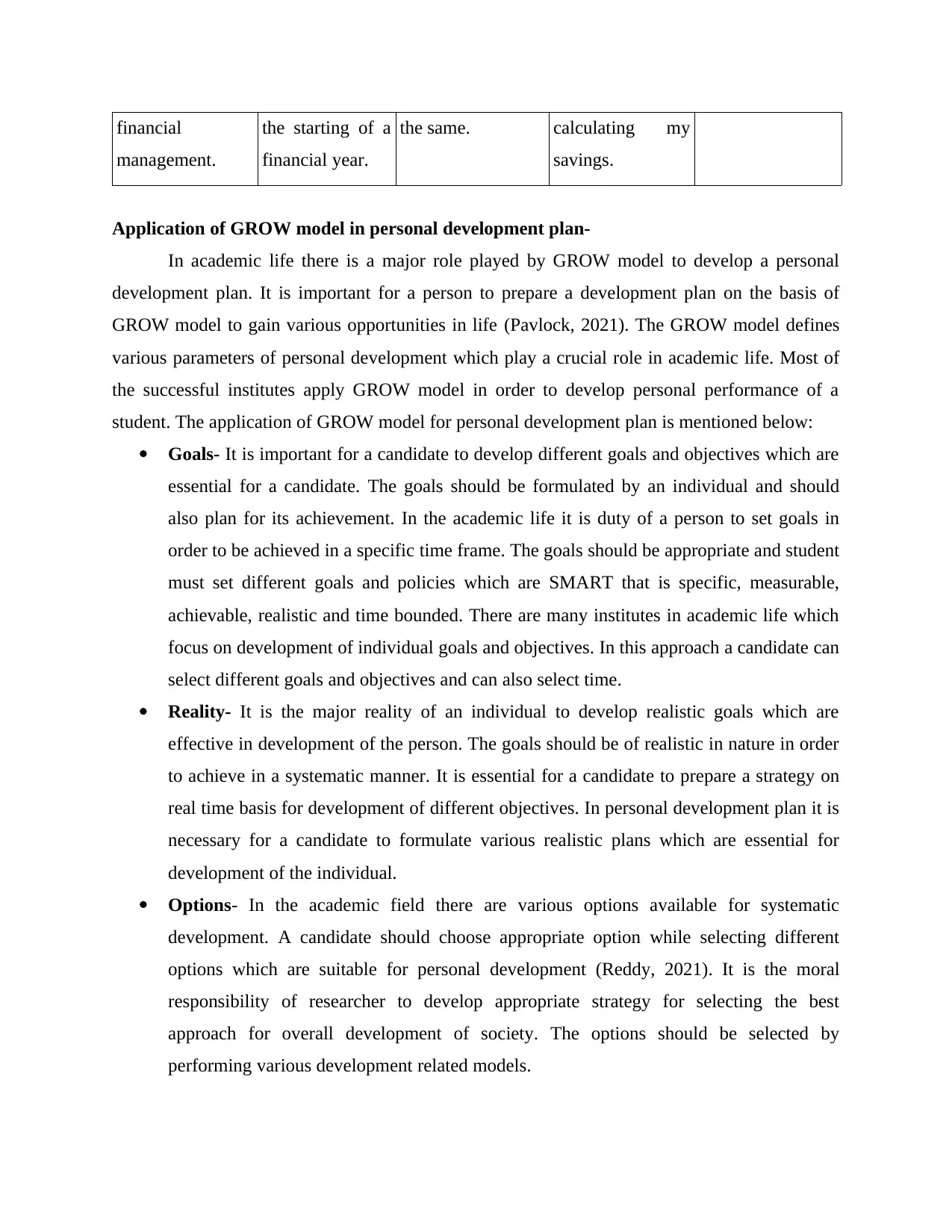
financial
management.
the starting of a
financial year.
the same. calculating my
savings.
Application of GROW model in personal development plan-
In academic life there is a major role played by GROW model to develop a personal
development plan. It is important for a person to prepare a development plan on the basis of
GROW model to gain various opportunities in life (Pavlock, 2021). The GROW model defines
various parameters of personal development which play a crucial role in academic life. Most of
the successful institutes apply GROW model in order to develop personal performance of a
student. The application of GROW model for personal development plan is mentioned below:
Goals- It is important for a candidate to develop different goals and objectives which are
essential for a candidate. The goals should be formulated by an individual and should
also plan for its achievement. In the academic life it is duty of a person to set goals in
order to be achieved in a specific time frame. The goals should be appropriate and student
must set different goals and policies which are SMART that is specific, measurable,
achievable, realistic and time bounded. There are many institutes in academic life which
focus on development of individual goals and objectives. In this approach a candidate can
select different goals and objectives and can also select time.
Reality- It is the major reality of an individual to develop realistic goals which are
effective in development of the person. The goals should be of realistic in nature in order
to achieve in a systematic manner. It is essential for a candidate to prepare a strategy on
real time basis for development of different objectives. In personal development plan it is
necessary for a candidate to formulate various realistic plans which are essential for
development of the individual.
Options- In the academic field there are various options available for systematic
development. A candidate should choose appropriate option while selecting different
options which are suitable for personal development (Reddy, 2021). It is the moral
responsibility of researcher to develop appropriate strategy for selecting the best
approach for overall development of society. The options should be selected by
performing various development related models.
management.
the starting of a
financial year.
the same. calculating my
savings.
Application of GROW model in personal development plan-
In academic life there is a major role played by GROW model to develop a personal
development plan. It is important for a person to prepare a development plan on the basis of
GROW model to gain various opportunities in life (Pavlock, 2021). The GROW model defines
various parameters of personal development which play a crucial role in academic life. Most of
the successful institutes apply GROW model in order to develop personal performance of a
student. The application of GROW model for personal development plan is mentioned below:
Goals- It is important for a candidate to develop different goals and objectives which are
essential for a candidate. The goals should be formulated by an individual and should
also plan for its achievement. In the academic life it is duty of a person to set goals in
order to be achieved in a specific time frame. The goals should be appropriate and student
must set different goals and policies which are SMART that is specific, measurable,
achievable, realistic and time bounded. There are many institutes in academic life which
focus on development of individual goals and objectives. In this approach a candidate can
select different goals and objectives and can also select time.
Reality- It is the major reality of an individual to develop realistic goals which are
effective in development of the person. The goals should be of realistic in nature in order
to achieve in a systematic manner. It is essential for a candidate to prepare a strategy on
real time basis for development of different objectives. In personal development plan it is
necessary for a candidate to formulate various realistic plans which are essential for
development of the individual.
Options- In the academic field there are various options available for systematic
development. A candidate should choose appropriate option while selecting different
options which are suitable for personal development (Reddy, 2021). It is the moral
responsibility of researcher to develop appropriate strategy for selecting the best
approach for overall development of society. The options should be selected by
performing various development related models.
⊘ This is a preview!⊘
Do you want full access?
Subscribe today to unlock all pages.

Trusted by 1+ million students worldwide
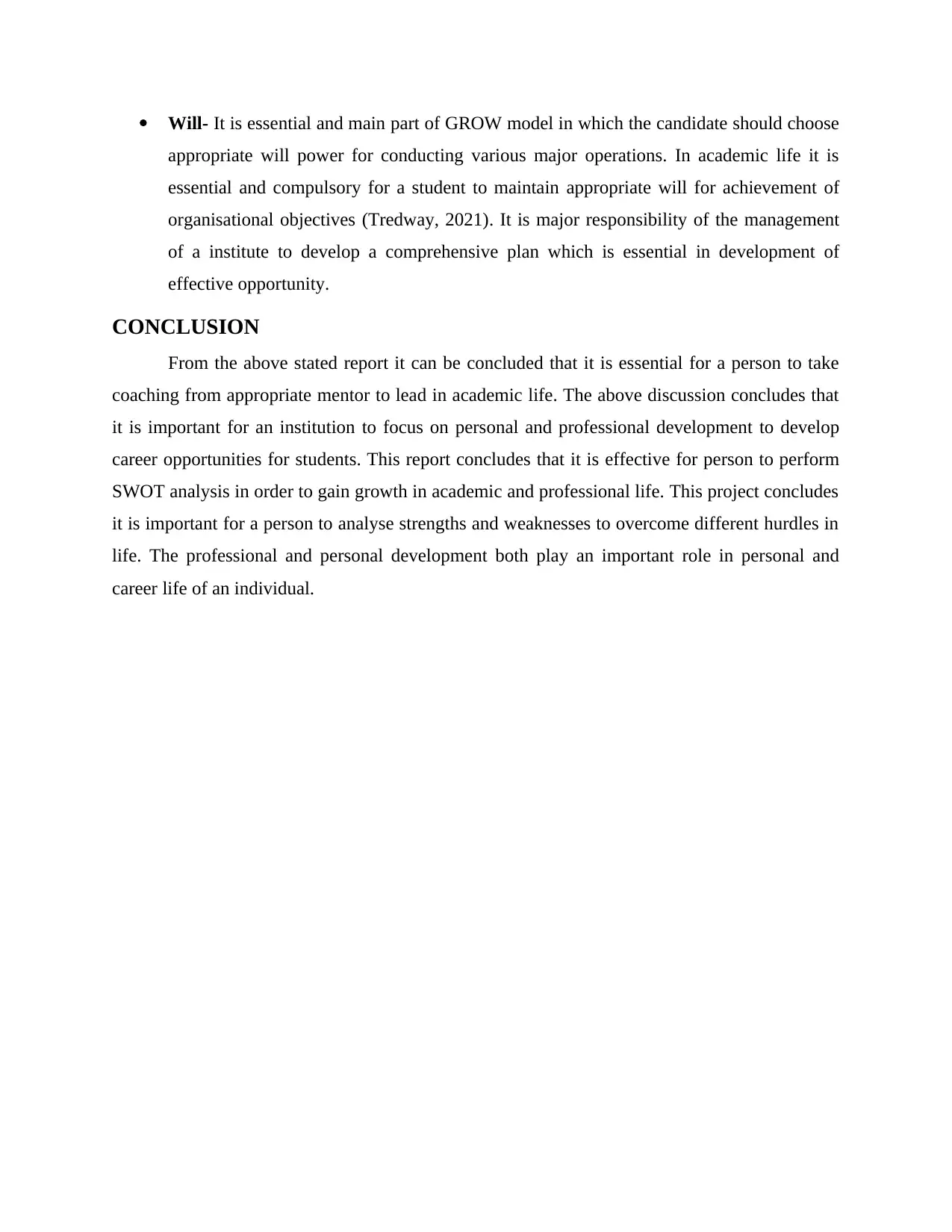
Will- It is essential and main part of GROW model in which the candidate should choose
appropriate will power for conducting various major operations. In academic life it is
essential and compulsory for a student to maintain appropriate will for achievement of
organisational objectives (Tredway, 2021). It is major responsibility of the management
of a institute to develop a comprehensive plan which is essential in development of
effective opportunity.
CONCLUSION
From the above stated report it can be concluded that it is essential for a person to take
coaching from appropriate mentor to lead in academic life. The above discussion concludes that
it is important for an institution to focus on personal and professional development to develop
career opportunities for students. This report concludes that it is effective for person to perform
SWOT analysis in order to gain growth in academic and professional life. This project concludes
it is important for a person to analyse strengths and weaknesses to overcome different hurdles in
life. The professional and personal development both play an important role in personal and
career life of an individual.
appropriate will power for conducting various major operations. In academic life it is
essential and compulsory for a student to maintain appropriate will for achievement of
organisational objectives (Tredway, 2021). It is major responsibility of the management
of a institute to develop a comprehensive plan which is essential in development of
effective opportunity.
CONCLUSION
From the above stated report it can be concluded that it is essential for a person to take
coaching from appropriate mentor to lead in academic life. The above discussion concludes that
it is important for an institution to focus on personal and professional development to develop
career opportunities for students. This report concludes that it is effective for person to perform
SWOT analysis in order to gain growth in academic and professional life. This project concludes
it is important for a person to analyse strengths and weaknesses to overcome different hurdles in
life. The professional and personal development both play an important role in personal and
career life of an individual.
Paraphrase This Document
Need a fresh take? Get an instant paraphrase of this document with our AI Paraphraser
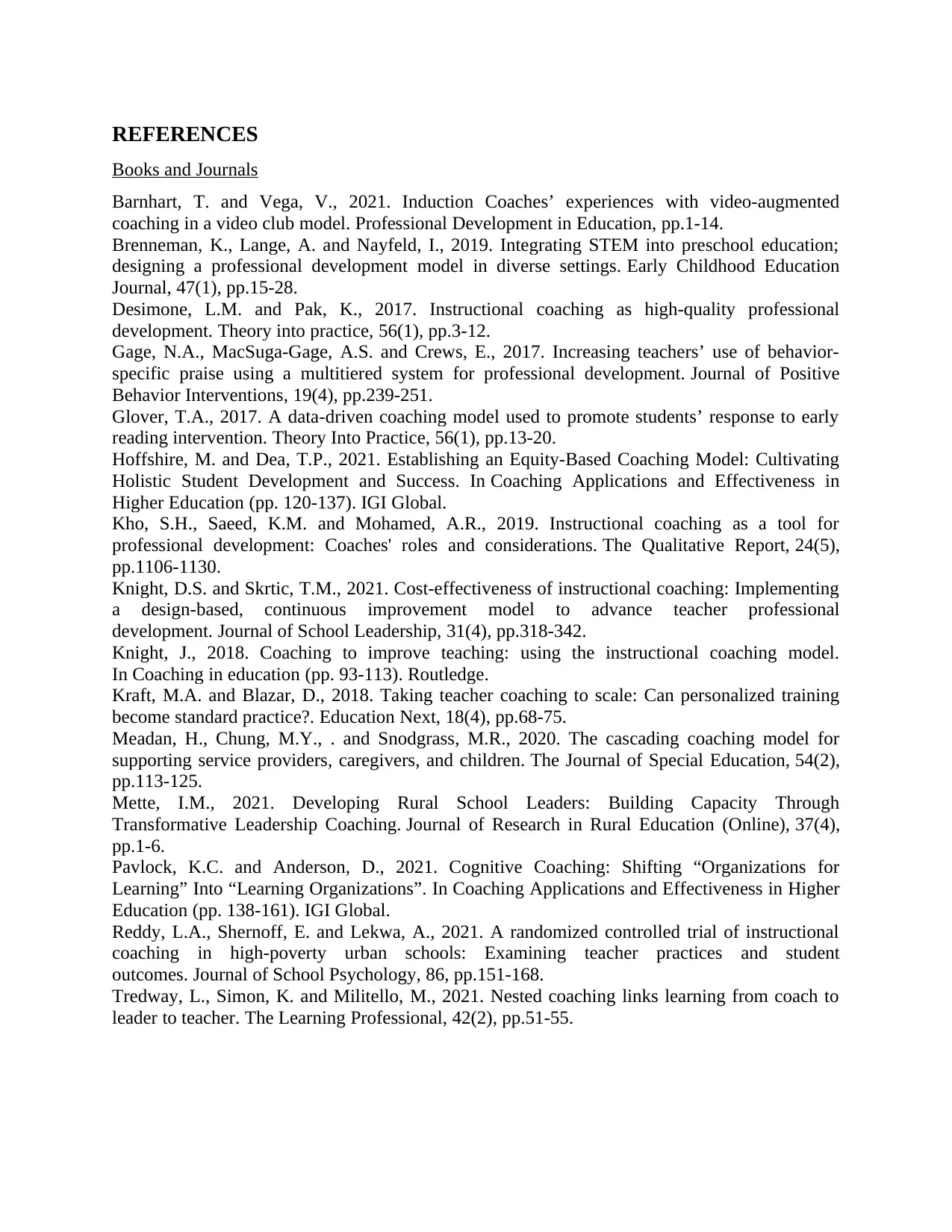
REFERENCES
Books and Journals
Barnhart, T. and Vega, V., 2021. Induction Coaches’ experiences with video-augmented
coaching in a video club model. Professional Development in Education, pp.1-14.
Brenneman, K., Lange, A. and Nayfeld, I., 2019. Integrating STEM into preschool education;
designing a professional development model in diverse settings. Early Childhood Education
Journal, 47(1), pp.15-28.
Desimone, L.M. and Pak, K., 2017. Instructional coaching as high-quality professional
development. Theory into practice, 56(1), pp.3-12.
Gage, N.A., MacSuga-Gage, A.S. and Crews, E., 2017. Increasing teachers’ use of behavior-
specific praise using a multitiered system for professional development. Journal of Positive
Behavior Interventions, 19(4), pp.239-251.
Glover, T.A., 2017. A data-driven coaching model used to promote students’ response to early
reading intervention. Theory Into Practice, 56(1), pp.13-20.
Hoffshire, M. and Dea, T.P., 2021. Establishing an Equity-Based Coaching Model: Cultivating
Holistic Student Development and Success. In Coaching Applications and Effectiveness in
Higher Education (pp. 120-137). IGI Global.
Kho, S.H., Saeed, K.M. and Mohamed, A.R., 2019. Instructional coaching as a tool for
professional development: Coaches' roles and considerations. The Qualitative Report, 24(5),
pp.1106-1130.
Knight, D.S. and Skrtic, T.M., 2021. Cost-effectiveness of instructional coaching: Implementing
a design-based, continuous improvement model to advance teacher professional
development. Journal of School Leadership, 31(4), pp.318-342.
Knight, J., 2018. Coaching to improve teaching: using the instructional coaching model.
In Coaching in education (pp. 93-113). Routledge.
Kraft, M.A. and Blazar, D., 2018. Taking teacher coaching to scale: Can personalized training
become standard practice?. Education Next, 18(4), pp.68-75.
Meadan, H., Chung, M.Y., . and Snodgrass, M.R., 2020. The cascading coaching model for
supporting service providers, caregivers, and children. The Journal of Special Education, 54(2),
pp.113-125.
Mette, I.M., 2021. Developing Rural School Leaders: Building Capacity Through
Transformative Leadership Coaching. Journal of Research in Rural Education (Online), 37(4),
pp.1-6.
Pavlock, K.C. and Anderson, D., 2021. Cognitive Coaching: Shifting “Organizations for
Learning” Into “Learning Organizations”. In Coaching Applications and Effectiveness in Higher
Education (pp. 138-161). IGI Global.
Reddy, L.A., Shernoff, E. and Lekwa, A., 2021. A randomized controlled trial of instructional
coaching in high-poverty urban schools: Examining teacher practices and student
outcomes. Journal of School Psychology, 86, pp.151-168.
Tredway, L., Simon, K. and Militello, M., 2021. Nested coaching links learning from coach to
leader to teacher. The Learning Professional, 42(2), pp.51-55.
Books and Journals
Barnhart, T. and Vega, V., 2021. Induction Coaches’ experiences with video-augmented
coaching in a video club model. Professional Development in Education, pp.1-14.
Brenneman, K., Lange, A. and Nayfeld, I., 2019. Integrating STEM into preschool education;
designing a professional development model in diverse settings. Early Childhood Education
Journal, 47(1), pp.15-28.
Desimone, L.M. and Pak, K., 2017. Instructional coaching as high-quality professional
development. Theory into practice, 56(1), pp.3-12.
Gage, N.A., MacSuga-Gage, A.S. and Crews, E., 2017. Increasing teachers’ use of behavior-
specific praise using a multitiered system for professional development. Journal of Positive
Behavior Interventions, 19(4), pp.239-251.
Glover, T.A., 2017. A data-driven coaching model used to promote students’ response to early
reading intervention. Theory Into Practice, 56(1), pp.13-20.
Hoffshire, M. and Dea, T.P., 2021. Establishing an Equity-Based Coaching Model: Cultivating
Holistic Student Development and Success. In Coaching Applications and Effectiveness in
Higher Education (pp. 120-137). IGI Global.
Kho, S.H., Saeed, K.M. and Mohamed, A.R., 2019. Instructional coaching as a tool for
professional development: Coaches' roles and considerations. The Qualitative Report, 24(5),
pp.1106-1130.
Knight, D.S. and Skrtic, T.M., 2021. Cost-effectiveness of instructional coaching: Implementing
a design-based, continuous improvement model to advance teacher professional
development. Journal of School Leadership, 31(4), pp.318-342.
Knight, J., 2018. Coaching to improve teaching: using the instructional coaching model.
In Coaching in education (pp. 93-113). Routledge.
Kraft, M.A. and Blazar, D., 2018. Taking teacher coaching to scale: Can personalized training
become standard practice?. Education Next, 18(4), pp.68-75.
Meadan, H., Chung, M.Y., . and Snodgrass, M.R., 2020. The cascading coaching model for
supporting service providers, caregivers, and children. The Journal of Special Education, 54(2),
pp.113-125.
Mette, I.M., 2021. Developing Rural School Leaders: Building Capacity Through
Transformative Leadership Coaching. Journal of Research in Rural Education (Online), 37(4),
pp.1-6.
Pavlock, K.C. and Anderson, D., 2021. Cognitive Coaching: Shifting “Organizations for
Learning” Into “Learning Organizations”. In Coaching Applications and Effectiveness in Higher
Education (pp. 138-161). IGI Global.
Reddy, L.A., Shernoff, E. and Lekwa, A., 2021. A randomized controlled trial of instructional
coaching in high-poverty urban schools: Examining teacher practices and student
outcomes. Journal of School Psychology, 86, pp.151-168.
Tredway, L., Simon, K. and Militello, M., 2021. Nested coaching links learning from coach to
leader to teacher. The Learning Professional, 42(2), pp.51-55.

⊘ This is a preview!⊘
Do you want full access?
Subscribe today to unlock all pages.

Trusted by 1+ million students worldwide
1 out of 13
Related Documents
Your All-in-One AI-Powered Toolkit for Academic Success.
+13062052269
info@desklib.com
Available 24*7 on WhatsApp / Email
![[object Object]](/_next/static/media/star-bottom.7253800d.svg)
Unlock your academic potential
Copyright © 2020–2025 A2Z Services. All Rights Reserved. Developed and managed by ZUCOL.



